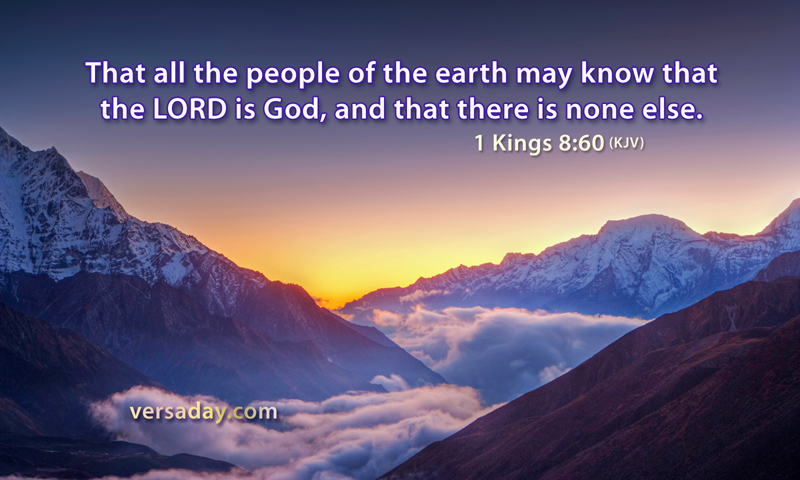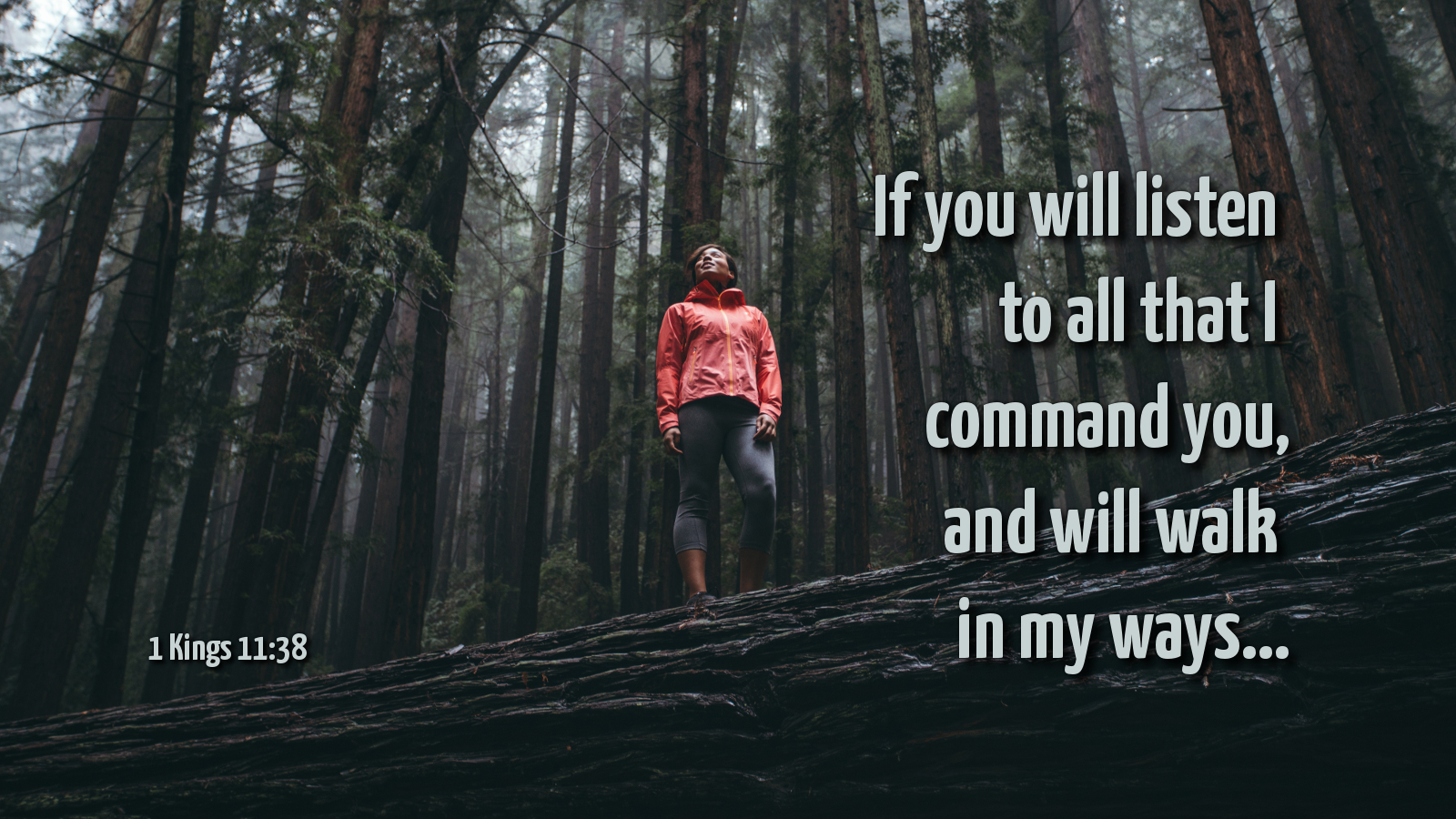Summary 1 Kings 8:22-66:
Solomon dedicates God’s temple, praising God for His faithfulness and asking God to keep His promises. Solomon asks God to hear their prayers and judge fairly. He asks God to forgive His people when they turn from Him but then return to Him. He asks God to forgive and act so the people will fear God. He asks God to answer the prayers of foreigners to glorify His name. He asks God to support them in war and to hear the prayers of those who have sinned against him and forgive them. Then he blesses the people and prays for them to always follow God’s laws. Then Solomon made sacrifices and offerings to the Lord and the people celebrated for 14 days. Everyone left glad in heart for all the good things God had done for them.
BSF Study Questions People of the Promised Land 1: Lesson 27, Day 5: 1 Kings 8:22-66:
12) Solomon understands that God is omnipotent, that He is in control, and everything happens because of God. He understands God is faithful, trustworthy, forgiving, and just. He understands God’s greatness, that He can’t just occupy one building but is everywhere. He focused on God’s past fulfillment of promises, His present fulfillment, and His future fulfillment of promises.
13) Solomon prays for the people of Israel to be forgiven when they sin and turn away from the Lord. He understands they need a leader. He understands they need God to teach them how to live. He understands they need God in war. He understands they need God to hear them. He understands that people will hear of God’s goodness and deeds and turn to Him. He understands everyone needs God.
14) Personal Question. My answer: Solomon praises God for all He’s done, thanks God for all He’s done and all He will do, and acknowledging our transgressions before asking for God’s forgiveness. He also asks God to fulfill His promises. This is something I’ve not done and will try to do. Ask God, for He won’t give if you don’t ask.
Conclusions BSF Study Questions People of the Promised Land 1 Lesson 27 Day 5: 1 Kings 8:22-66:
Great lesson in how to pray.
End Notes BSF Study Questions People of the Promised Land 1 Lesson 27, Day 5: 1 Kings 8:22-66:
![Image result for 1 kings 8]() Solomon’s prayer
Solomon’s prayer
Spreading your hands towards heaven was the most common posture of prayer in the Old Testament. Many modern people close their eyes, bow their head, and fold their hands as they pray; but the Old Testament tradition was to spread out the hands toward heaven in a gesture of surrender, openness, and ready reception.
“Solomon’s prayer is far from new, and is full of quotations from the Pentateuch, some of which are almost word for word, while the sense of the whole may be found in those memorable passages in Leviticus and Deuteronomy.” (Spurgeon)
Highlights of Solomon’s Prayer
- Solomon first thanked and praised God for His past fulfillment of promises.
- Solomon called upon God to keep the promises that He made. This is the great secret to power in prayer – to take God’s promises to heart in faith, and then to boldly and reverently call upon Him to fulfill the promises.
- Solomon asked God to forgive the people.
If we don’t claim God’s promises, God’s promises are left unclaimed.
Though God had a special presence in the temple, He was far too great to be restricted to the temple.
Solomon asked God to incline His ear towards the king and the people when they prayed toward the temple. For this reason, many observant Jews still pray facing the direction of the site of the temple in Jerusalem.
- The temple grounds were used as a place to verify and authorize oaths. When a dispute came down to one word against another, Solomon asked that the temple would be a place to properly swear by, he asked God to enforce from heaven the oaths made at the temple.
- Solomon asked God to hear the prayers of a defeated, yet humble and penitent Israel. God answered this prayer of Solomon, and He forgives and restores His defeated people when they come in humble repentance.
- A man did not have to be sinless or righteous to have his prayer answered at the temple. He could be a guilty man, stricken by the plague of his own heart, and still find a gracious God when He came in humble repentance.
- Solomon prayed for a blessing on every military excursion.
The foreigner at the temple
The temple was in Israel, but it was always intended to be a house of prayer for all nations (Isaiah 56:7). God wanted the court of the Gentiles to be a place where the nations could come and pray.
The violation of this principle made Jesus angry. When He came to the temple and found the outer courts – the only place where the Gentile nations could come and pray – more like a swap meet than a house of prayer, He drove out the moneychangers and the merchants (Matthew 21:13)
“When they sin against You (for there is no one who does not sin)”: This is a succinct Old Testament statement of the principle most clearly stated in Romans 3:23: for all have sinned and fall short of the glory of God.

Solomon prays for the Israelites on his knees
1 Kings 8:22 tells us that Solomon began this prayer standing, but some time before he finished, he fell to his knees in reverence to God.
- Ezra prayed on his knees (Ezra 9:5),
- the Psalmist called us to kneel (Psalm 95:6),
- Daniel prayed on his knees (Daniel 6:10),
- people came to Jesus kneeling (Matthew 17:14, Matthew 20:20, Mark 1:40),
- Stephen prayed on his knees (Acts 7:60),
- Peter prayed on his knees (Acts 9:40),
- Paul prayed on his knees (Acts 20:36, Ephesians 3:14),
- other early Christians prayed on their knees (Acts 21:5).
- Most importantly, Jesus prayed on His knees (Luke 22:41).
- The Bible has enough prayer not on the knees to show us that it isn’t required, but it also has enough prayer on the knees to show us that it is good.
Solomon again shows the often-neglected missionary impulse God wanted in Israel. Blessing to Israel wasn’t meant to end with Israel; God wanted to bless the world through Israel.
Feast of Tabernacles
This was a staggering – almost grotesque – amount of sacrifice. Each animal was ritually sacrificed and a portion was dedicated to the LORD, and the remainder was given to the priests and the people. It was enough to feed a vast multitude for two weeks.
It was such a great amount of sacrifice that they specially consecrated the area in front of the temple to receive sacrifices, because the bronze altar that was before the LORD was too small to receive the burnt offerings.
This Feast of Tabernacles extended beyond its normal seven days on this special occasion.
The writer remembers that it was David’s heart and vision that started the work of the temple (2 Samuel 7:1-3 and following).
This was the highlight of Solomon’s reign. “How happy must these people have been, and how prosperous, had their king continued to walk uprightly before God! But alas! the king fell, and the nation followed his example.” (Clarke)

 Solomon’s prayer
Solomon’s prayer Abiathar was a survivor.
Abiathar was a survivor.
 God heard Solomon’s prayer
God heard Solomon’s prayer






 Jesus used the Queen of Sheba as an example of a seeker: The queen of the South will rise up in the judgment with this generation and condemn it, for she came from the ends of the earth to hear the wisdom of Solomon; and indeed a greater than Solomon is here (
Jesus used the Queen of Sheba as an example of a seeker: The queen of the South will rise up in the judgment with this generation and condemn it, for she came from the ends of the earth to hear the wisdom of Solomon; and indeed a greater than Solomon is here (

 Multiplying horses was in direct disobedience to
Multiplying horses was in direct disobedience to  Psalm 72:5-7
Psalm 72:5-7 Psalm 72:15-17
Psalm 72:15-17
 This is an almost unbelievable number of marriage partners. His wives were considered princesses, but his concubines were legal partners without the same standing as wives. All said, Solomon had far more marriage partners than any man could possibly give attention to.
This is an almost unbelievable number of marriage partners. His wives were considered princesses, but his concubines were legal partners without the same standing as wives. All said, Solomon had far more marriage partners than any man could possibly give attention to. David was probably not yet in heaven (
David was probably not yet in heaven (


 Hadad sought to avenge his conquered people. He found refuge and support in Egypt. We are not told specifically how Hadad troubled or was an adversary to Solomon, only that he returned to bother Solomon with the permission of Pharaoh.
Hadad sought to avenge his conquered people. He found refuge and support in Egypt. We are not told specifically how Hadad troubled or was an adversary to Solomon, only that he returned to bother Solomon with the permission of Pharaoh.
 God promised to divide Israel and put ten of the twelve tribes under Jeroboam as judgment for the sin and idolatry of Solomon. God would still keep one tribe under the house of David in faithfulness to His promise to David.
God promised to divide Israel and put ten of the twelve tribes under Jeroboam as judgment for the sin and idolatry of Solomon. God would still keep one tribe under the house of David in faithfulness to His promise to David. Theme of Ecclesiastes 12:
Theme of Ecclesiastes 12: At the end of advancing age is eternity. Remember God before this life is over. Life is meaningless without God.
At the end of advancing age is eternity. Remember God before this life is over. Life is meaningless without God.
 Fun Fact: “Ancient books were generally written on papyrus scrolls. It was practical to have a scroll about thirty-five feet in length. When it got any longer it got too bulky to carry around. This physical limitation has determined the length of many books of the Bible.” (Boice) Luke used two scrolls to tell his story, and one we call “The Gospel of Luke” and the other we call “The Book of Acts.”
Fun Fact: “Ancient books were generally written on papyrus scrolls. It was practical to have a scroll about thirty-five feet in length. When it got any longer it got too bulky to carry around. This physical limitation has determined the length of many books of the Bible.” (Boice) Luke used two scrolls to tell his story, and one we call “The Gospel of Luke” and the other we call “The Book of Acts.”
 The Speaking of Tongues
The Speaking of Tongues